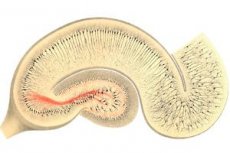New publications
A woman's brain is capable of changing in size
Last reviewed: 02.07.2025

All iLive content is medically reviewed or fact checked to ensure as much factual accuracy as possible.
We have strict sourcing guidelines and only link to reputable media sites, academic research institutions and, whenever possible, medically peer reviewed studies. Note that the numbers in parentheses ([1], [2], etc.) are clickable links to these studies.
If you feel that any of our content is inaccurate, out-of-date, or otherwise questionable, please select it and press Ctrl + Enter.

The staff of the leading German Institute of Human Consciousness and Brain (IHB – Max Planck Society, Leipzig) have come to the conclusion through scientific and experimental research that the brain volume of the fair sex can change cyclically. To be more precise, only one part of the brain – the hippocampus – changes. Such a change occurs monthly, and estrogens – female sex hormones – are to blame.
About three dozen female volunteers took part in the experiment. For several weeks in a row, their blood was taken for analysis, monitoring the level of sex hormones in the blood. At the same time, the participants regularly underwent magnetic resonance imaging of the brain, monitoring its condition.
During the experiment, it was discovered that estrogens significantly affect the course of almost all processes in the female body. At the same time, along with the increase in the level of hormones in the blood, a separate area of the brain - the hippocampus - also increased in size.
By the way, the hippocampus is the part of the brain responsible for memorability, long-term memory processes, the formation of emotions and spatial orientation. The human brain has two hippocampi, localized in the temporal lobes of the brain. Both hippocampi are connected to each other by neural fibers passing in the fornix of the brain.
It is not yet entirely clear to scientists whether the discovered cyclical changes can somehow influence the state of the female psyche. However, there is every reason to believe that they do. A little earlier, this study was conducted on female white mice: as a result, it was noted that their well-being and behavior changed dramatically during periods of cyclical enlargement of the hippocampus.
Experts suggest that periodic psycho-emotional surges in women, which are often very noticeable (anxiety, irritability, tearfulness, depression, etc.), may also be associated with an increase in a certain area of the brain.
In the future, the institute's staff plans to continue the experimental research that has begun. Possible goals for subsequent experiments will be:
- study of the influence of cyclic changes in brain regions on women's intellectual abilities;
- study of the possibility of preventing and treating postpartum depression in women.
Since the study found that the hippocampus increases during ovulation and decreases during menstrual bleeding, this can be used to create a regimen for taking certain medications to minimize the negative effects of these cyclic periods. It is likely that medical professionals will soon be able to directly influence the nervous system, balancing and normalizing the level of estrogen hormones in the body. This will stabilize the psycho-emotional state and well-being of women without negatively affecting hormonal processes and the endocrine system.
